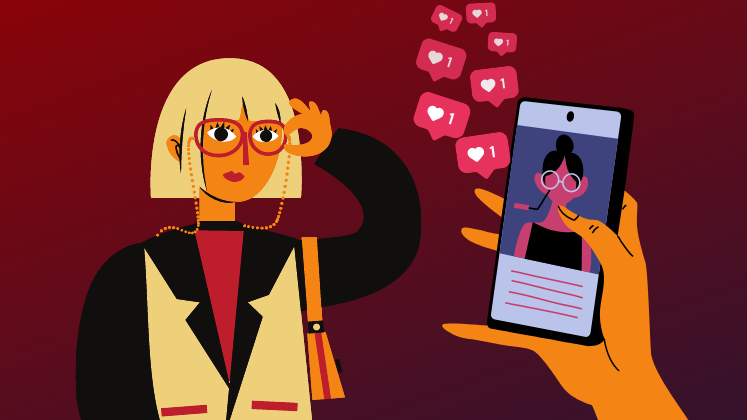Reflecting on a recent LSE Library late hosted by The Women’s Library at LSE, Gillian Murphy considers the ongoing influence of the The Women’s Library on research, education, culture and society.
“The reading room was buzzing!”
“People talking about objects from my youth and events that I lived through as ‘archives’ made me feel very old … but being part of tonight also made me feel very young again and full of energy!”
These are just two comments we received following LSE Library’s first Library Late on the eve of International Women’s Day 2024. The catalyst for the event was the ten-year anniversary of the official opening of The Women’s Library Reading Room, a beautiful space on the 4th floor of the library for readers to consult archives during the day. On this night though, the reading room was full of people enjoying the collection, looking at displays of See Red Women’s Workshop posters, material from Greenham Common Women’s Peace Camp, or taking the opportunity to read the iconic women’s liberation movement magazine Spare Rib.
 Attendees listened to short talks by some of the researchers who have used the collection with mini displays of the material they had consulted, such as copies of the West Indian Gazette produced by Claudia Jones. Downstairs in the vault, people were treated to ‘behind the scenes’ tours of materials including banners and other archives with staff providing context. There were also tours of the digitisation suite with a few open mouths and gasps during demonstrations.
Attendees listened to short talks by some of the researchers who have used the collection with mini displays of the material they had consulted, such as copies of the West Indian Gazette produced by Claudia Jones. Downstairs in the vault, people were treated to ‘behind the scenes’ tours of materials including banners and other archives with staff providing context. There were also tours of the digitisation suite with a few open mouths and gasps during demonstrations.
The graphic artist, Nadina Ali, joined us in the education room and facilitated a drop-in art activity inspired by the archives. Nadina uses bold and colourful typography to challenge the status quo, which chimes particularly with the See Red posters whose artwork questioned sexism and other inequalities in the 1970s and 1980s. There was also a chance to find out about other organisations and projects complementary to the Women’s Library.
The Library Late provides a flavour of the diverse ways in which The Women’s Library continues to facilitate new work and enrich society.
The Library Late provides a flavour of the diverse ways in which The Women’s Library continues to facilitate new work and enrich society. Officially founded in 1926, The Women’s Library has a long reputation as a collection of special national importance. The value of the collection derives not only from its subject matter, the changing status of women in modern society, but also the varied nature of its holdings, which include archives, ephemera, banners, badges, textiles, photographs, postcards and posters. The significance of the collection was formally recognised in 2007, when it was awarded Designation status, while a selection of documents relating to women’s suffrage was awarded UNESCO UK Memory of the World status in 2011 as part of a joint Inscription with related documents from the Parliamentary Archives.
 The range and depth of primary sources in The Women’s Library continue to influence many users, from schools, Higher Education teaching and research and beyond to the many groups that visit to see the archives during the year. As you might expect, The Women’s Library has contributed significantly to research and scholarship through the publication of countless academic books and articles. It has also supported a diverse range of innovative academic, community and specialist research projects. For instance, Digital Drama’s immersive drama, creative banner-making workshops and touring exhibition in 2017 was based on the archives of Endell Street Military Hospital and the work of the not-for-profit performance company, Alfie James Productions, produced and performed a play at the Hen and Chicken Theatre in Highbury (London) in April 2023 after researching the suffrage material.
The range and depth of primary sources in The Women’s Library continue to influence many users, from schools, Higher Education teaching and research and beyond to the many groups that visit to see the archives during the year. As you might expect, The Women’s Library has contributed significantly to research and scholarship through the publication of countless academic books and articles. It has also supported a diverse range of innovative academic, community and specialist research projects. For instance, Digital Drama’s immersive drama, creative banner-making workshops and touring exhibition in 2017 was based on the archives of Endell Street Military Hospital and the work of the not-for-profit performance company, Alfie James Productions, produced and performed a play at the Hen and Chicken Theatre in Highbury (London) in April 2023 after researching the suffrage material.
Through its exhibition programme and by loaning material to support other national institutions such as Tate Britain, the LSE library has also worked to widen access to these collections. This has included pop-up displays and monthly drop-ins where students and the general public can find out about the material we hold. This exhibition programme is complemented by a free public programme of events that includes literary talks, panel discussions, performances, art and craft, film and workshops that engage with the exhibition and collection themes.
Our in-house digitisation suite has also enabled us to launch a digitisation on demand service, providing researchers with free copies of material from the collections to save them travelling to the reading room in person.
We curate and publish a growing collection of digitised content on LSE Digital Library, which are freely available online with full-text searching offering the potential to find new avenues of research. This includes digitised content from The Women’s Library, but also born-digital archives, such as the oral histories of women involved in the Women’s Voluntary and Community Sector that grew out of the women’s liberation movement of the 1970s. Our in-house digitisation suite has also enabled us to launch a digitisation on demand service, providing researchers with free copies of material from the collections to save them travelling to the reading room in person.
 The collection has inspired many artists. In 2010, Nicola Malkin, a ceramist who plays with scale, colour and form, produced a number of pieces to be displayed amongst the open access books in the old reading room of the Women’s Library after consulting the archives. This included a huge suffragette hunger strike medal resting on the books and tiny porcelain new-born babies tucked amongst the shelves as a sympathetic response to the archive on women who ‘stole’ babies. More recently, the digital colourist Marina Amaral, has manually added colour to reproduce the photograph of Rosa May Billinghurst which ‘brings her to life’.
The collection has inspired many artists. In 2010, Nicola Malkin, a ceramist who plays with scale, colour and form, produced a number of pieces to be displayed amongst the open access books in the old reading room of the Women’s Library after consulting the archives. This included a huge suffragette hunger strike medal resting on the books and tiny porcelain new-born babies tucked amongst the shelves as a sympathetic response to the archive on women who ‘stole’ babies. More recently, the digital colourist Marina Amaral, has manually added colour to reproduce the photograph of Rosa May Billinghurst which ‘brings her to life’.
As part of the Library’s programme for schools, we have developed partnerships with London primary schools to deliver creative projects inspired by the collections. An example is the Change for People by People project, which explored how activism by individuals can bring change through looking at history, visual literacy, art and language. This six-month project contributed to the family part of LSE’s annual public festival.
The Women’s Library provides substantial content for the Library’s social media. We use the collection to highlight a wide range of women’s history, but also touch on issues around race, class, sexuality, colonialism and cultural norms to embrace the intersectionality of the collection and diversity of our audience.
Finally, The Women’s Library is supported by the Friends of The Women’s Library who fund acquisitions, digitisation and conservation projects. They also offer essay prizes to LSE students who have made extensive, though not exclusive, use of the archives and primary print material of The Women’s Library in their 3rd year and MSc dissertations.
The Women’s Library shows that, whilst libraries and archives might appear to be repositories of historic material and records of past deeds, they do in fact play a vital role in how we understand the world today. We hope that the next decade of The Women’s Library reading room at LSE is as fruitful as the first.
Readers can find an overview of the collections of The Women’s Library here and can browse visual material from The Women’s Library on its flickr page. More information on the library’s Learning programme for schools here and videos of recent library events can be viewed on our YouTube channel.
The content generated on this blog is for information purposes only. This Article gives the views and opinions of the authors and does not reflect the views and opinions of the Impact of Social Science blog (the blog), nor of the London School of Economics and Political Science. Please review our comments policy if you have any concerns on posting a comment below.
Featured image credit: LSE Library.







